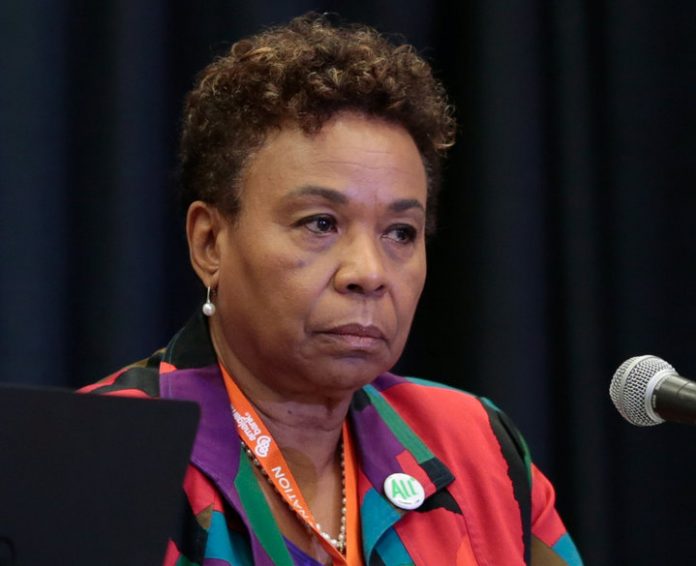WASHINGTON ― As Democrats plan for a potential future in which they have control of the U.S. House, officials, applicants and outside gatherings near the gathering are unobtrusively setting up another push against the ignored war in Afghanistan.
The last time the gathering controlled the lower council of Congress, the U.S. had near 50,000 troops in Afghanistan. Today that number is 15,000 — however it’s been eight years, there’s still no clearness about when the longest war in American history will really reach an end. President Donald Trump’s expressed arrangement is that the U.S. nearness has no time confine.
So Democrats are thinking about since quite a while ago examined proposition to torpedo the war’s whole lawful defense — the general post-9/11 congressional approval that has been utilized to help U.S. military activity well past Afghan outskirts — and tie subsidizing for the crusade to unmistakably sketched out key objectives and troop decreases. There’s likewise discuss utilizing new oversight forces to hold top authorities, military administrators, protection contractual workers and remote accomplices responsible for allegations of human rights infringement, debasement and political posing at the expense of human lives. And keeping in mind that party pioneers are reluctant to focus on a specific course, they feel certain this is an issue their partners and their political base see as a need.
An emotional yet now to a great extent overlooked vote in June 2017 underscored why this is a characteristic battle for Democrats. House Appropriations Committee legislators from the two gatherings voted in favor of the first run through for a measure since a long time ago pushed by war faultfinder Rep. Barbara Lee (D-Calif.) that would cancel the approval. GOP authority suppressed the exertion, yet it obviously flagged that, following quite a while of agonizing over being viewed as excessively timid, Democrats have achieved a minute when even the other party and its voters can genuinely consider genuine antiwar activity.
“We’ve made some amazing progress… from only one vote in restriction [when the approval came up in 2001] to an across the board acknowledgment among individuals from Congress this was an excessively wide approval that set the phase for interminable war,” Lee wrote in an email to HuffPost. She sees Democratic solidarity on the issue today: “There’s a ton of shared conviction over the council around holding this discussion and vote.”

Outside figures in incessant contact with driving Democrats agree. “Completion the war in Afghanistan isn’t really a periphery position in the Democratic Party,” said Kate Kizer of the dynamic association Win Without War. Ned Price, a previous CIA official who worked for President Barack Obama and now helps run a gathering called National Security Action, concurred, taking note of that any partition is more on the best way to change course without rearing unsteadiness than the subject of whether it’s an ideal opportunity to do as such.
That doesn’t mean the discussion will be simple. It will pit legislators content with the present state of affairs against figures once in the past observed as periphery and vocal new associates disparaging of the Democratic political machine — a large number of whom blame Obama for at last surrendering his objective of bringing home the last U.S. troops from Afghanistan. What’s more, it will include adjusting legislators’ different needs, from battle back change to social insurance. The expectation among its advocates is that the vitality ― of new hopefuls, of protection from Trump, of disappointment with current legislative issues ― is their ally.
“On the off chance that you take a gander at the new individuals who are coming into Congress, a large number of these people, and in addition a decent extent of the American open, were all preteens when this war began,” Kizer said. “So I think as the war proceeded with, there’s a genuine inquiry of, what’s going on with us?”
If you look at the new members who are coming into Congress, many of these folks, as well as a good proportion of the American public, were all preteens when this war started.
Any discussion will be educated by the very much recorded disappointments of American intends to change Afghanistan and build up an administration and security structure that can keep it from again turning into a play area for fierce gatherings that may focus on the U.S. The Afghan government presently controls just marginally the greater part the nation, a congressionally ordered assessor general investigated Nov. 1 ― the most minimal level since the guard dog started its following. Whatever is left of the country is under the influence of the Taliban, the hard-line assemble the U.S. ousted, and different associations like the Islamic State.
“I have for quite some time been a defender of an arranged, conciliatory answer for the war in Afghanistan and for a conclusion to this war period. Tragically, the war in Afghanistan has gotten us to facilitate ― not closer ― to accomplishing those objectives,” composed Lee, who are required to go up against another House position of authority in the following Congress.
From War Vote To Peace Bills
Lee started standing up to the possibility of interminable war three days after the assaults of 9/11.
Democrats have from that point forward attempted to test the legitimate defenses for wars in the House and Senate, weight the official branch ― incorporating Obama ― with votes against war subsidizing and featured squanders of citizen cash and different disappointments in verifiable offers to raise doubt about the entire undertaking. They have sometimes won Republican collaboration, in any case, in almost every occasion, Congress has implicitly honored Pentagon-driven solicitations for troop increments.
What’s diverse currently is that long stretches of declining battling on the ground make it harder to contend that the last Obama procedure proceeded by Trump ― of keeping U.S. troops in Afghanistan while authoritatively saying that they’re not occupied with battle and that harmony is conceivable ― is working. Then, Trump’s very own talk addressing remote approach orthodoxies and partitions with his gathering on issues like exchange and U.S. partnerships have made it less demanding for officials and outside gatherings to consider national security moves that may have been unthinkable before January 2017.
“The menu of choices hasn’t changed much in the previous 10 years,” said Shamila Chaudhary, a Johns Hopkins University examiner who served in the White House under Obama, taking note of that Democrats and Republicans have both invested years stressing over what may occur in Afghanistan without a U.S. nearness.
In any case, it’s simpler to settle on various decisions from that menu.
With the Trump organization pushing another abnormal state endeavor at talks between the U.S.- sponsored Afghan government and the Taliban development while all the while increase troop numbers, Democrats can lead congressional weight for real advancement toward an arranged harmony, Lee composed.
Previous Obama guides are as of now supporting the exertion by indicating their own achievement in little scale commitment with the activist gathering ― helping clarify that the methodology is not really a Trump advancement.
Rep. Adam Smith (D-Wash.), who will seat the House Armed Services advisory group if the Democrats take the House, is relied upon to utilize hearings and extended forces to examine Pentagon contentions.
What’s more, Trump’s hesitance to discuss human rights issues leaves the field to Democrats to feature issues like Afghan military maltreatment and support for warlords, Chaudhury stated, reinforcing their general case for an extreme end to the contention.
With officers presently enrolling who weren’t even alive when the U.S. attacked Afghanistan, the years-long mushrooming of motivations to scrutinize the war implies almost every sort of legislator can get behind one, staff members and activists say.
New Voices In The Chorus
Amy McGrath is utilized to individuals needing to talk Afghanistan. They ask the resigned Marine lieutenant colonel, a Kentucky Democrat who’s turned out to be a standout amongst another known possibility for office this race cycle, why U.S. troops are still there and say it feels like America is losing. She disclosed to HuffPost she reacts by making a discourse ― she comprehends the disappointment, however, she feels probably some level of American help is basic to keep the formation of an aggressor asylum.
She’s brisk to take note of that she hasn’t been there since 2010 when she served her last visit in Helmand region.
That still, obviously, gives her a level of on-the-ground encounter route past that of most by far of her future associates in the event that she wins her tight race.

“Congress throughout the previous 17 years has completely punted it since they would prefer not to be considered mindful,” McGrath said of the discussion over how to deal with the war. “This is absurd.”
Two gatherings pose a potential threat in the product of applicants key to the Democrats’ expectations of taking the House and general vitality around the gathering this year. Both will probably include vigorously in discussions about issues like Afghanistan.
Military veterans like McGrath and regular folks who have worked in national security, as Abigail Spanberger in Virginia, Elissa Slotkin in Michigan and Andy Kim in New Jersey, have pitched their first-time crusades as a feature of a long lasting call to an obligation in the interest of the nation. A large number of them are near outside strategy specialists ― both Spanberger and McGrath have been in contact with Obama helpers engaged with the National Security Action gathering, representatives told HuffPost ― who consider Trump to be a peril to critical U.S. commitment around the globe and are careful about radical change.
The other circle is related to all the more gladly left applicants: Alexandria Ocasio-Cortez in New York, Rashida Tlaib in Michigan, Ayanna Pressley in Massachusetts, Ilhan Omar in Minnesota and Ammar Campa-Najjar in California. They’re less vocal on outside arrangement, however, are relied upon to agree with effectively chosen partners, for example, antiwar pioneer Rep. Ro Khanna (D-Calif.). They’re altogether embraced by the Khanna-connected gathering Justice Democrats, which was framed by previous presidential battle staff for Sen. Bernie Sanders (I-Vt.). Until further notice, they and their accomplices on Capitol Hill are concentrating on the foundation for a more grounded dynamic job in Congress more than on particular issues, a Democratic assistant acquainted with the connections with HuffPost.
Molded by comparative encounters and governmental issues, those gatherings are probably going to depend on one another as they ponder prickly new issues in their new occupations, United likewise by the feeling of being newcomers.
“When we get together, we kind of all get it… we have all been over yonder, we know it,” McGrath said. Rep. Conor Lamb (D-Pa.), a Marine veteran who won a unique decision not long ago, disclosed to HuffPost he hadn’t yet known about the dynamic exertion to pull back from Afghanistan.
When we get together, we sort of all get it… we have all been over there, we know it.
Be that as it may, the coalitions as of now concur on key basics like opposing Trump’s assaults on the Affordable Care Act or the requirement for changes to Democratic authority in the House. On Afghanistan, as well, the refinement doesn’t need to prompt a conflict ― dark blue or just hardly Democratic locale across the nation appears exhausted. The two sides disclosed to HuffPost that for the time being they’re idealistic about cooperating.
“I’m energized by the number of veterans and national security authorities running for office,” Lee composed. “Nobody comprehends the expenses and results of these wars superior to them.”
Also, the following couple of weeks ― directly after the midterms ― could indicate how that sort of collaboration is as of now occurring.
A Post-Midterm Model
Democrats would like to move by December against an alternate war: a U.S. battle of flying refueling, insight support and arms deals for Saudi Arabia and the United Arab Emirates, who are together battling an activist gathering bolstered by Iran in Yemen. It’s a dry keep running of sorts for the Afghanistan battle.
The Yemen war, which started after the ace Iran Houthi development grabbed the capital from a Saudi-upheld government, has delivered the world’s most noticeably bad helpful emergency and bipartisan shock in Congress reflected in progressively tight votes on arms deals.
Presently Sanders, Khanna, and others need the House and Senate to cast a ballot up or down on bills that would end the U.S. bolster for the Saudi-UAE alliance by and large ― and with United Nations admonitions about the danger of starvation developing more critical and shock about the U.S.- Saudi relations after the killing of Saudi columnist Jamal Khashoggi, they feel the time is ready.
A Democratic assistant associated with the measure indicated the help of the No. 2 House Democrat, Rep. Steny Hoyer of Maryland, Smith of the Armed Services Committee, ground-breaking Reps. Nita Lowey (D-N.Y.) and Eliot Engel (D-N.Y.), and scores of others, including some outstanding Republicans. In the Senate, Sanders and his partners had figured out how to prevail upon the greater part the chamber in the spring.
Inquired as to why not pause, especially if the House swings blue, the helper noticed the feelings of trepidation of across the board starvation in Yemen and the conviction that a vote against the war may send an essential flag, putting the ball in Trump’s court and setting Democrats up to squeeze him in the new Congress.
Forecasting likely fights on Afghanistan and other disputable commitment like in Syria, the expectation is the Yemen battle will join Democrats around the U.S. war that is maybe hardest of all to legitimize and demonstrate the gathering’s base that its agents can complete things.
“Congress has not reasserted its capacity on war-production for, quite a while,” said Kizer, the Win Without War dissident. “So these war powers battles indicate they’re beginning to practice that muscle and understanding that general society needs them to take up these hard votes.”
Or on the other hand truly, decisions matter.
“With this confident blue wave around endeavoring to check a wild president, attempting to get control him over in all structures and re-invigorate Congress as a parallel branch, I believe that that will likewise fit building a more altruistic, limited U.S. remote arrangement,” the helmer said.


















